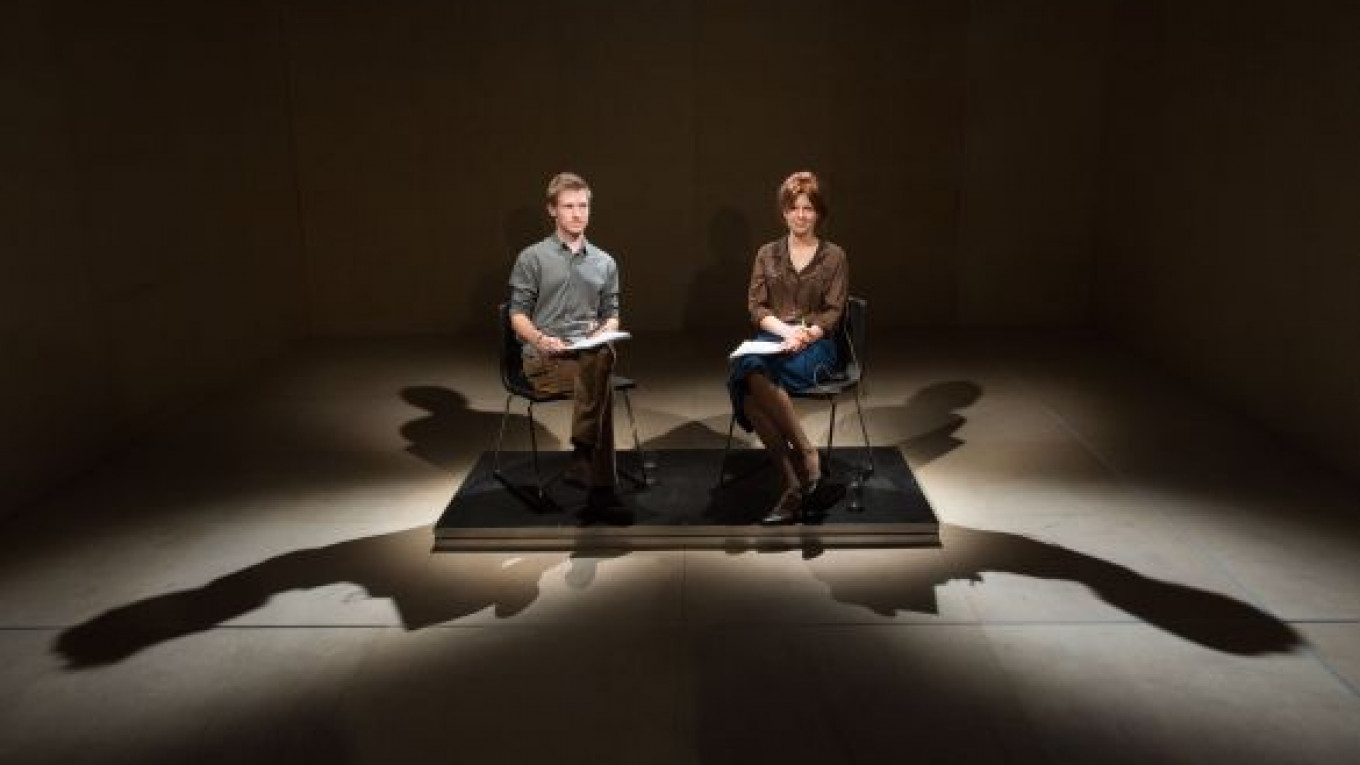Ivan Vyrypayev's dramatization of "Grace and Grit" at Praktika Theater is not the usual theatrical celebration, that's for sure. Although it is, without a doubt, a celebration of life.
The audience at the performance I attended barely mustered enough applause to bring the actors back on stage for a curtain call. Surely that was due in part to the fact that not everyone was in tune with this difficult and starkly told tale. But it was also because applause seemed to be a totally inadequate, even improper, response.
"Grace and Grit" is a memoir and meditation written by American philosopher Ken Wilber on the basis of a diary kept by his wife Treya Wilber as she died of cancer over a five-year period in the 1980s.
Vyrypayev chose to have his actors — American Cazimir Liske and Pole Karolina Gruszka — speak their parts in English. For spectators without English, a live translation read by Vyrypayev offstage is provided by way of earphones.
"Grace and Grit" features a bare minimum of theatrical fuss. The performers sit on chairs and read from scripts they hold in their laps. They occasionally stop simultaneously to take sips from tall, clear glasses of water.
Liske, usually taking on the persona of Ken Wilber, reads in a businesslike, emotionally detached manner. Wilber's words of confusion, anger, anguish and wisdom are left to speak for themselves. Liske almost never allows any expression to cross his face.
Gruszka, giving life to the words that Treya Wilber jotted down in her diary of self discovery, is slightly more flexible. Speaking with an attractive, soft Polish accent that only rarely obscures meaning, she oozes a sense of warmth. On occasion when listening to her partner she allows herself wry or knowing smiles that help create a tentative, but tangible connection between the two.
This, frankly, is not a performance, to which I feel comfortable applying a critical approach. It is, quite literally, a personal tale of life and death.
The story begins with the two meeting at the home of a mutual friend. Although they only spoke for 15 minutes in the course of that evening, they shared an unexpected embrace that convinced both they were meant for each other.
They were married shortly thereafter and tragedy struck immediately. Ten days after the wedding, Treya, whose given name was still Terry at that time, was diagnosed with breast cancer. Instead of going to Hawaii, they spent their honeymoon in the hospital where she was operated on.
Thus began a spiritual journey that saw Wilber cease writing altogether as he increasingly became a caregiver, while Terry slowly changed her beliefs about who she was and what her purpose was on earth. She came to abandon the goal-oriented attitude that she felt was reflected in her "male" given name of Terry, refashioning that name to Treya and taking on what she believed to be a more female attitude towards life, one of accepting and being, as opposed to doing.
Neither Ken nor Treya in their writings hide the difficulties that cancer wrought on their lives.
In one devastating moment, Ken admits losing control so fully that he began hitting Treya over and over. Later, having made peace with his wife and himself not only over that incident but in regards to her impending death as well, he describes a powerful experience in a German bar when a group of elderly men gently forced him to dance with them although none of them spoke a word of each other's language.
The lack of theatricality in the performances is juxtaposed with the subtly changing visual and sonic space created by designers Vyrypayev and Yury Milyutin, video artist Vsevolod Taran, lighting designer Sergei Vasilyev and sound producer Alexander Chubenko. The walls surrounding the actors act as screens that show strips of static, boxes of color and dappled images that, perhaps, are reminders of the cancer cells at work in Treya's body. Droning electronic musical backgrounds are abruptly cut off to mark moments of emotional transition.
"Grace and Grit" is hardly theater at all. It is, rather, an attempt to cut through the artificialities of theater in order to establish deep communication on a real, personal level. Each person entering and exiting the theater will determine how successful that is on his or her own.
"Grace and Grit" (Blagodat i Stoikost) plays Dec. 30 at 8 p.m. at Praktika Theater, located at 30 Bolshoi Kozikhinsky Pereulok. Metro Mayakovskaya. Tel. 495-544-5545. Running time: 3 hours, 5 minutes.
Contact the author at jfreedman@imedia.ru
A Message from The Moscow Times:
Dear readers,
We are facing unprecedented challenges. Russia's Prosecutor General's Office has designated The Moscow Times as an "undesirable" organization, criminalizing our work and putting our staff at risk of prosecution. This follows our earlier unjust labeling as a "foreign agent."
These actions are direct attempts to silence independent journalism in Russia. The authorities claim our work "discredits the decisions of the Russian leadership." We see things differently: we strive to provide accurate, unbiased reporting on Russia.
We, the journalists of The Moscow Times, refuse to be silenced. But to continue our work, we need your help.
Your support, no matter how small, makes a world of difference. If you can, please support us monthly starting from just $2. It's quick to set up, and every contribution makes a significant impact.
By supporting The Moscow Times, you're defending open, independent journalism in the face of repression. Thank you for standing with us.
Remind me later.







